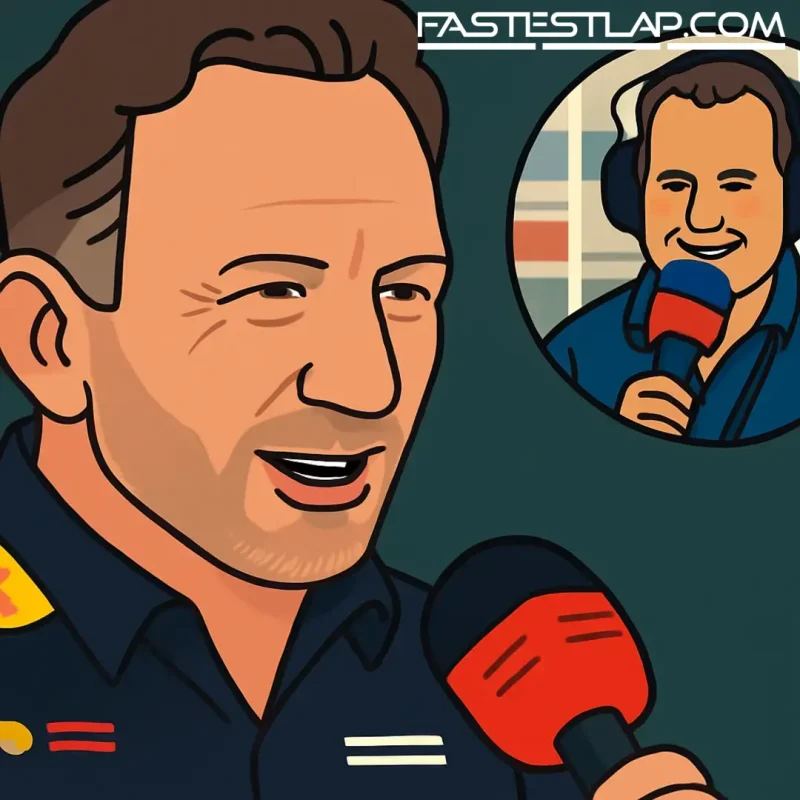Ted Kravitz on Christian Horner: ‘He wanted to win every interview’
Christian Horner’s been off the Red Bull pit wall since Silverstone, but the imprint he left on F1’s daily theatre is still being felt — especially by those who had to face him with a microphone.
Sky Sports’ Ted Kravitz has lifted the lid on what it was like interviewing Horner at full tilt, calling the former Red Bull boss “intensely competitive” even when the cameras rolled. In Kravitz’s telling, Horner treated interviews the way he treated race strategy: something to outfox.
“He wanted to win out of every interview,” Kravitz told the Telegraph. “He wants to win out of everything.” For a paddock that long ago figured out Horner could spin, parry, and counter in one breath, it tracks.
Horner’s abrupt exit in the wake of the British Grand Prix left Red Bull without the architect of its modern era, and the paddock minus one of its foremost protagonists. Two months later, the team and Horner formally parted ways. While no figures were disclosed, it’s been widely reported — including by PlanetF1 — that a financial compromise in the region of $100 million was agreed, potentially freeing Horner to reappear in F1 as early as the second half of 2026.
You might have expected opponents to applaud his departure. They didn’t. McLaren CEO Zak Brown, never shy of a jab in the heat of battle, instead gave a nod to the CV: drivers’ titles, constructors’ titles, relentless execution. “Not everyone’s best friends,” Brown said, “but that’s what makes it exciting.”
Even Toto Wolff, who spent a decade-plus locked in a very public duel with Horner, admitted he misses the foil. The Mercedes boss called him polarising and controversial — one of the sport’s main cast members — and the sport feels different without him.
Kravitz, who’s done as many tough pit-lane questions as anyone, says Horner understood the game and played to the gallery behind the lens. “Christian knew a lot of people at Red Bull were on the other side of the camera,” he said. “He wanted to be seen as fighting for them as well.”
He recalled one exchange from early this season that showed the dynamic in full. With Liam Lawson enduring a rough start — three straight Q1 exits across his opening two weekends — Kravitz went in with what he dubbed a “fastball.”
“I said, ‘Do you have a little problem with Liam?’” Kravitz remembered. Horner didn’t bite, offering the stock line: we’ll address it. “If you give a bit of an explanation for the viewer — ‘he’s struggling in Turn 6’, whatever — fine,” Kravitz said. “But it was the way he said ‘we’ll take a look at it’ that set off the reaction in my head.”
That reaction, in true live-TV Ted fashion, came out as a jab: You didn’t pay off Checo for this, did you? Is he not the quicker driver you wanted? Cue the Horner stare. Interview over.
If you’ve watched the pair spar across the years, you can picture it: Kravitz prodding, Horner measuring the risk in the reply, both knowing the subtext will hang in the air longer than any soundbite. It was box office.
As for what’s next, Horner’s name will inevitably swirl around vacancies. Alpine and Aston Martin are the speculative hits in 2025’s rumour mill, but PlanetF1 understands he’s not in active discussions and is focused on family for now. Given the settlement timeline being floated, the real window to watch is 2026, when new regulations kick in and teams start thinking in cycles rather than sticking plasters.
Whether you cheered Red Bull or bristled at the dominance, Horner was the lightning rod — the paddock politician who could sell a vision to a sponsor at breakfast, tweak a strategy at lunch, and win the 6 p.m. media scrum by dinner. F1 rarely replaces characters like that overnight.
And if he does return? Don’t be surprised if the first stop on his gridwalk is the Sky pad. Kravitz will have the fastball ready. Horner, you suspect, will be swinging.




